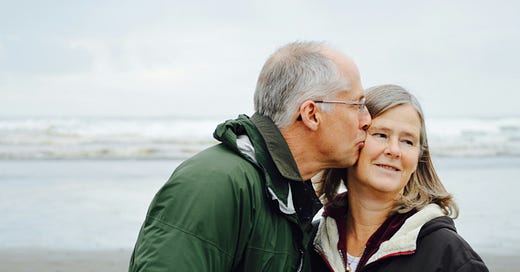A Tribute to the Elders, by Walterrean Salley I thought upon the elderly And whispered a prayer, Giving thanks to God For their sojourn here. Such kind and gentle souls From generations ago, What they are to us, They will never know. A sure and beaten path. A guide along the way. The dedicated laborer Who's now old and gray. Patriarchs and matriarchs, And early pioneers. The bridge that has brought us As we've journeyed here. Soldiers of great sacrifice, Treasured more than art. We honor, love and cherish them Deep within our heart.
Take a piece of paper. At the top, write the word old. Then jot down any thoughts, feelings, or descriptions that come to mind. Just let the words flow naturally.
Now, on another part of that paper, write the word elder. Again, write the words or images that come to you.
Do you see any differences between old and elder?
When you step back and look at the two lists, something becomes clear. Most people, without even realizing it, associate old with decline. They picture someone hunched over, perhaps walking with a cane, in poor health, forgetful, and nearing the end of life. The word often carries with it a quiet sense of pity, or even dismissal.
But when you read the list for elder, you’ll likely find very different words. Words like wise, experienced, respected, educated, thoughtful, maybe even spiritual. An elder is seen as someone who teaches, who leads, who still has something important to say.
These are not small differences. They reveal the way we, as a culture, think about aging. And they reveal a painful truth. We are often guilty of seeing aging only through the lens of decline, rather than through the lens of growth, contribution, and wisdom.
Even in hospitals and clinics, these differences show up. A physician might look at someone and think, “He’s old,” and unconsciously treat that person as though they have nothing left to offer. But shift the frame ever so slightly to, “He’s an elder,” and the whole picture changes. Now the person is seen as someone who has lived, someone who still matters.
This matters more than ever today. Thanks to better medical care and nutrition, people are living longer—well into their 80s, 90s, and beyond. That’s not a burden. That’s a gift. A longer life is a chance to do more, give more, and continue being part of the world.
Older people are not just sitting around waiting. Many are working. Some are volunteering in schools, helping children learn to read. Others are working in food pantries or shelters. Some are mentoring younger people in their professions or leading groups in community centers.
I know, because I am one of them. I am 82 years old. My body may not move quite as fast as it once did, but my mind is active, clear, and deeply engaged. I write essays like this one. I try to bring meaning and comfort to people’s lives. I continue to grow, to reflect, and to contribute.
One of the most important things I’ve learned is this: at any age, we need purpose. It is the key to happiness. Whether we are young or old, we all need to feel useful, to feel that our lives matter. When people lose their sense of purpose, they begin to feel lost.
Just a few days ago, a woman I know, in her early forties and a single mother to an adolescent daughter, told me something that stayed with me. She said that in her view, she doesn’t “work” in the traditional sense. What she does is provide important services to others, especially elders. She sees them as the very people who helped build this country. She believes they have made immense contributions to our society, and she treats them with deep respect. She doesn’t think in terms of jobs or paychecks. She thinks in terms of values and ethics. And she is proud to live her life with purpose.
We need more people like her. We need younger people to find a sense of meaning in their lives, just as elders must continue to hold onto their own.
To call someone old should never mean they are done. And to call someone an elder should always mean they are still needed.
We must begin to see aging not as a quiet fading, but as a stage of deep purpose. When we make that shift, we don’t just change the way we see others. We change the way we see ourselves.
MAKE NO MISTAKE, I’M AN ELDER









This was an excellent read and true in every sense. I’m 72 and consider myself an elder. Experience, wisdom, self-awareness, no rushing and the serenity I feel inside. Thank you for writing about old versus elder.
I admit that I was a younger person working hard and ignoring elders much more than I should.
I see myself in the article.